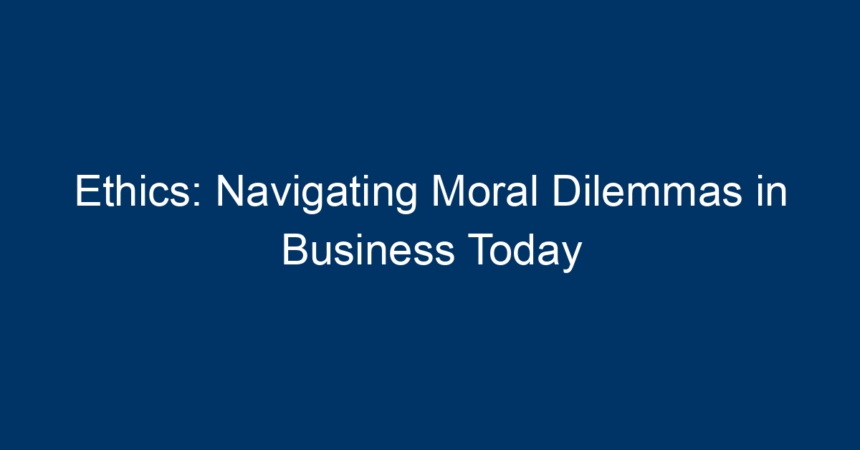In the contemporary business landscape, the concept of ethics has become more critical than ever. As companies navigate a myriad of moral dilemmas, from employee treatment to environmental concerns, understanding ethical principles is essential for sustainable success. This article delves into the significance of ethics in today’s business world, explores common ethical dilemmas, and provides actionable insights for navigating these challenges.
The Importance of Ethics in Business
Building Trust and Reputation
One of the cardinal reasons for prioritizing ethics in business is its direct impact on trust and reputation. Organizations that adhere to ethical practices tend to foster a strong reputation among consumers, investors, and employees. A 2021 survey revealed that over 70% of consumers consider a company’s ethical standards when making purchasing decisions.
Enhancing Employee Morale
When a business promotes an ethical culture, it naturally enhances employee morale. Workers who believe they are part of a principled organization are more likely to exhibit higher levels of job satisfaction and productivity. Furthermore, ethical workplaces often experience lower turnover rates, which translates to reduced hiring and training costs.
Long-term Success
Ethics in business is not merely about compliance; it’s a pathway to long-term success. Companies that engage in ethical decision-making are often better equipped to navigate crises, as they have established a base of loyal customers and supportive stakeholders.
Common Ethical Dilemmas in Business
Treatment of Employees
Issues related to employee treatment frequently present ethical dilemmas. For instance, companies must grapple with questions about fair wages, workplace safety, and respect for diversity. Examining the case of Amazon, which has faced scrutiny regarding employee working conditions, highlights how poor ethical standards can impact a company’s reputation and operational efficiency.
Environmental Responsibility
As climate change continues to be a pressing issue, businesses must make ethical decisions about their environmental responsibilities. Companies face dilemmas related to sustainability, such as whether to prioritize profit margins over eco-friendly practices. Brands like Nike have made strides in sustainability but still face criticism for their production processes. Balancing profitability with environmental care is a continual ethical challenge.
Transparent Marketing Practices
In a world filled with misinformation, ethical marketing is crucial. Companies must navigate the fine line between persuasive advertising and deceptive practices. Brands like Volkswagen which have been embroiled in scandal due to misleading information about emissions, illustrate the fallout of unethical marketing. Honesty in advertising is not just an ethical obligation; it’s a business imperative.
Framework for Ethical Decision-Making
Identify the Dilemma
The first step in ethical decision-making is clearly identifying the dilemma. Stakeholders might face conflicts between organizational goals and ethical considerations. This process involves asking critical questions: What is at stake? Who will be affected by my decision?
Gather Relevant Information
Decisions should be grounded in facts. Gathering relevant data provides a holistic view of the situation, allowing decision-makers to understand the implications of their choices fully. This step may include consulting legal guidelines, industry standards, and stakeholder opinions.
Consider the Stakeholders
In ethical decision-making, the interests of stakeholders must always be considered. This includes employees, customers, suppliers, and the community at large. Ethical decisions should aim for the greatest good while minimizing harm to others.
Evaluate Alternatives
After considering stakeholder interests, it’s essential to evaluate alternatives. This can involve brainstorming potential solutions, weighing their ethical implications, and assessing potential benefits and drawbacks. Encouraging collaboration and input from a diverse group can yield better outcomes.
Make the Decision and Implement It
Once all factors have been considered, it’s time to reach a decision. Leaders should communicate their choice transparently to relevant stakeholders while elucidating the reasons behind it. Implementation must be accompanied by monitoring to ensure compliance with ethical standards.
Integrating Ethics into Company Culture
Lead by Example
Organizational leaders play a fundamental role in embedding ethics into corporate culture. By demonstrating ethical behavior in their actions, executives help to set the tone for the rest of the organization. Leading by example instills a sense of accountability among employees.
Create an Ethics Policy
Developing a comprehensive ethics policy serves as a guide for employees. This policy should outline the company’s values, ethical expectations, and procedures for reporting unethical behavior. Training sessions can ensure that all employees understand the policy and its implications.
Foster Open Communication
Companies should encourage an environment of open dialogue where employees feel safe discussing ethical concerns. Mechanisms for reporting unethical practices—such as anonymous hotlines—can nurture a culture of transparency and accountability.
Continuous Training and Development
Regular training on ethical standards and dilemmas is essential to keep employees informed. Workshops, seminars, and online courses can help staff navigate complex ethical challenges they might face on a daily basis.
Case Studies: Ethics in Action
Starbucks’ Commitment to Ethical Sourcing
Starbucks has made significant strides in promoting ethical sourcing standards. Their Coffee and Farmer Equity (C.A.F.E) Practices incorporate social, economic, and environmental criteria. This approach supports farmers and understands consumer concerns regarding ethical sourcing.
Patagonia’s Environmental Advocacy
Patagonia exemplifies a company that places ethical considerations at the forefront of its business model. By prioritizing environmental activism and sustainable practices, Patagonia has carved out a niche for itself, appealing to conscientious consumers.
Johnson & Johnson’s Response to Crisis
When facing the Tylenol poisoning scare in the 1980s, Johnson & Johnson’s ethical commitment to consumer safety allowed the company to navigate a potential disaster effectively. Their rapid response and transparency ultimately enhanced their reputation rather than diminished it.
Conclusion: Actionable Insights for Ethical Business Practices
In navigating moral dilemmas, businesses must recognize that ethical practices are essential to building trust, enhancing employee morale, and ensuring long-term success. Here are some actionable insights for companies seeking to improve their ethical standards:
-
Develop Comprehensive Policies: Create clear ethics policies that outline expectations and responsibilities.
-
Educate and Train Employees: Regular training sessions can equip employees to handle ethical dilemmas confidently.
-
Encourage Reporting Mechanisms: Establish strong channels for reporting unethical behavior anonymously.
-
Regularly Evaluate Practices: Continuous assessments can help identify areas for improvement in ethical practices.
- Leadership Engagement: Encourage leaders to model ethical behavior in all aspects of their work.
By committing to ethical practices, businesses not only position themselves for success but also contribute positively to society. In today’s complex business environment, ethics is not just a guideline—it’s a necessity.




